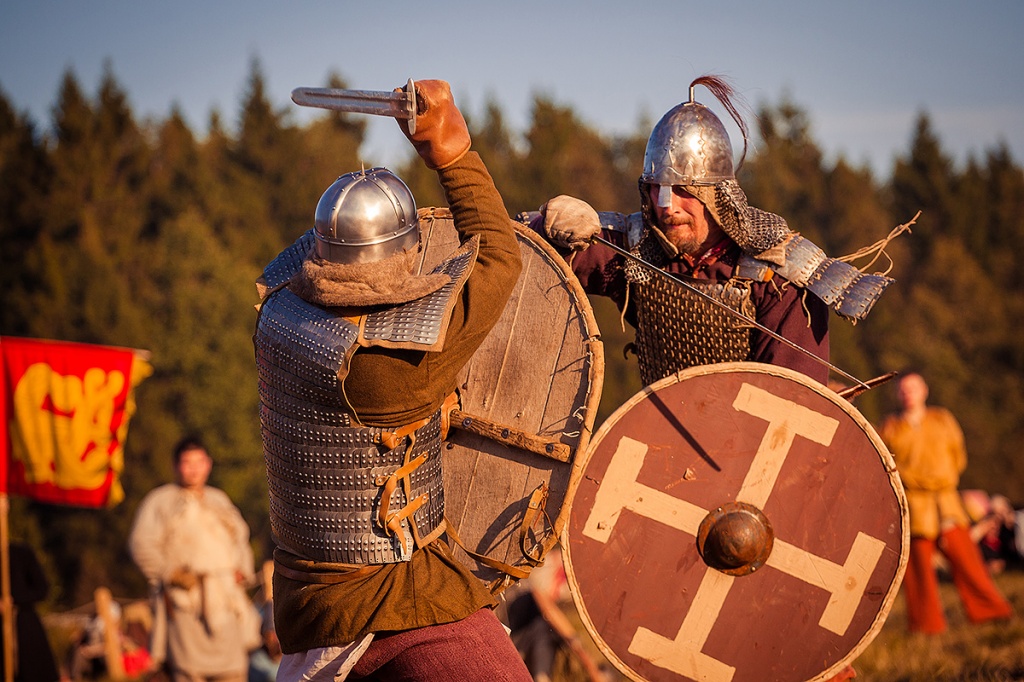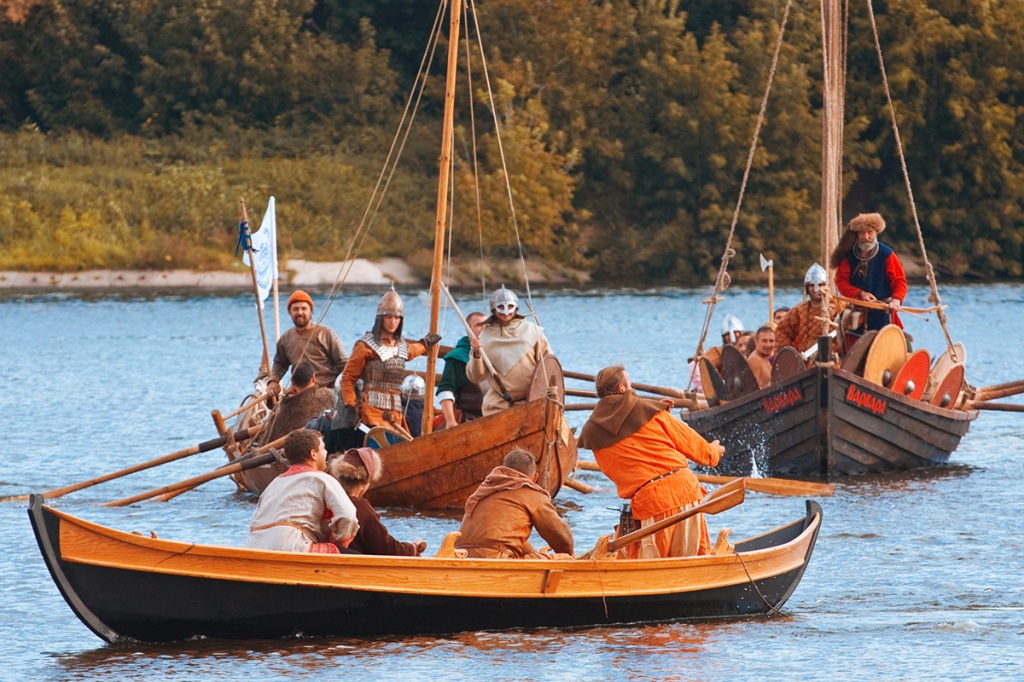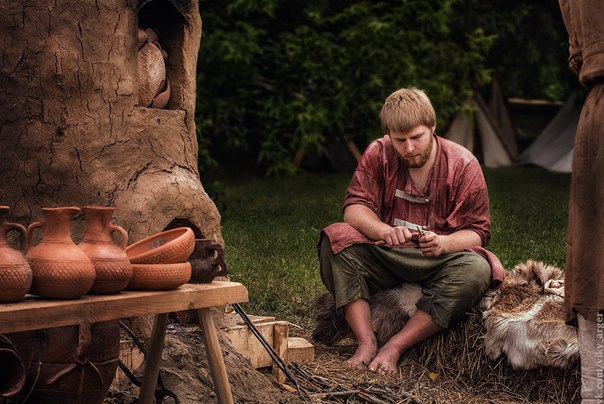Last weekend, it was hot in the reserve museum Kolomenskoye because of pottery kilns and clinking swords: “Thousand Swords Battle. Times and Epochs” Festival was going on. Despite the rain, there was no room in the field to swing a cat: free admission, kids zones, and the event itself, of course, gathered thousands of Moscovites to the festival. The festival was held on the Russia Day and the theme was relevant: Russia in 9-11 centuries.
At a meeting with journalists, Vladimir Chernikov – director of national politics, interregional relations and tourism department of Moscow city, named the “Thousand Swords Battle” one of the central events of the summer tourist season in Moscow and it can be understood – in five years, the festival has become traditional. Every year, it gets bigger itself and gathers more and more visitors. In 2015, it was visited by 32 thousand people, this year the number was expected to be four times bigger. The festival started in 2011 as a private initiative of re-enactors and rose so much that it is supported by the Government of Moscow now.

Historic re-enactment emerged in Russia at the beginning of 1990s as a hobby for those, who are interested in history and want to feel the Zeitgeist themselves. Don’t mix re-enactors and role-players up! Although the model is quite similar – both abandon civilized life, make a camp, live in the woods and play some activities. But role-players usually play “fantasy” and their costumes and accessories are often fictitious; re-enactors take it seriously. They re-enact historic facts, sew costumes from authentic materials according to authentic drawings and practice occupations they are working at now. Some judge, some fight, some hunt or do something else… This festival also had warriors, traders, potters, wood and amber cutters, smiths, weavers and bakers and many more.
Organizing events like this one, it is easy to go down in flames, but the organizers of the “Thousand Swords Battle” succeeded to avoid this – but it is not only about success, but about serious preparations and rigorous selection of the participants. Aleksey Ovcharenko – executive partner of the organizer (history projects agency “Ratobortsy”) told that every participant from 196 clubs this year were rigorously selected. We are certainly not speaking about casting: board of experts study costumes and accessories to comply with the historic epoch. One English guy almost got dismissed, but he manned up, rearranged his costume and managed to be selected.

By the way, in addition to the regions of Russia, 16 countries took part in it, including Sweden, France, and Israel. Concept of the organizers was a deep dive into the history of 9-10 centuries, re-enactment of household, battlefield activities and traditions of Ancient Russia and its neighbours. All the territory next to embankment was divided into thematic fields. Defenders of the Russian land were warding and training knights and reviewed the troops in the “Duke Camp”. In “Gardariki” there were Vikings, who came to serve for the Russian state. Some of them came on their own vessels, which were moored to the embankment. “Trading Quarter” showed the life of ordinary medieval Russian city dwellers, “Fair” was dedicated to trading, “Byzantine Empire” was full of imperial noblemen, who came to a meeting with the Russian duke, valiant horsemen were in the “Heath”, and Prince Wilhelm’s march dispositions stood in “Normandia”. Kids also had things to do – “Bylinafest” field worked at the fest with a battlefield in the middle of it.
The organizers were not surprised about the rains – they knew about the forecasts. Well, the festival would show not everyday life, but severe everyday life, that’s what they thought. They were right about the “deep dive”: it was constantly raining all day long on Saturday and on Sunday it stopped sometimes. Maybe it is not bad - the image was very realistic.
My question about how they cope with rains was met by a Murom native from the Vikings camp like this: “We waxed the boots yesterday. We’re using safe and proven methods”. A large delegation came to the festival from Murom – their legendary ancestor Ilya Muromets obliges the townsmen to respect history and keep the standards high. The guys from Murom stood in the “Vikings” camp, took part in water dragon hunting when one has to hit the target with a bow from board a vessel and did other things when free from hunting – sold wax, furs and fabrics, grilled fish, made wooden boats without nails. “Such boats are made of aspen, they are light. Two persons with a load can fit in this three-metre long boat. The boat is hollowed out from the whole trunk, then we oil it with linseed oil. In case it is used correctly, it can serve for decades”, told us one of the Murom guys thoroughly.
Thoroughness is a good trait of all the participants, they treat their hobby were seriously. Many of them have a respectful profession from the point of view of the modern world, but have been involved into re-enactment for many years and visit festivals in Russia and abroad a couple of times a year.

But it is not hobby for everyone. When walking in the heath nomads camp, I met a man, who was making a brick kiln to burn clay and we started to chat. They said they came from Samara, where they work at the “Ancient World” Samara Center of History Modelling and it is not a hobby for them, but a way of life. Maksim Borisov told that they organize the same kind of events, but in a smaller scale. Literally, as it is said in the statute, they «exercise educational tourism and historical education for adults and children”. Professional archeologists work here, it is a scientific practical field for them and this is what they do for a living. When I asked how this profession was paid, the head of the center Igor Subbotin, who started the center 13 years ago, smiled and answered, that it was enough for a living.
It is clear what motivates the participants, but what do the visitors seek? It seems the festival has met all the visitors’ need. Circuses? There were mush of them – massive battles were going on both days of the festival. Take for instance the heath horse riders with difficult stunts! And what about spear battles and the central fight - Thousand Swords Battle? It was an epic event
Bread? Here it is, right from the oven with a piece of lard. Souvenirs? More than enough and most of them are well-made things that will not only be a shelf decoration, but can also serve in everyday life. Delight? Look at all the faces and costumes around. Tickle ears? There was a middle ages music concert. And everything mixed up so well.
As I attended the festival on June 12, I remembered which day it was. I wanted to understand how important this coincidence was for the participants and visitors. I did not want to ask anybody about the “importance of the Russian identity” – these terms are suitable in lecture halls, but not here. While I was thinking on the question, the answer came itself: “We have been doing this for 15 years. Young guys come to the club, they have heard or read something, but all the theory does not work until you pass it through, touch it with your own hands. Then, in a couple of months with a sword in your hands, in armor, they start understanding something, something starts changing inside of them, they get some sort of thoroughness, or even some rootedness”, says Yuriy from Vladimir. And the symbolism comes to me itself – maybe, with the help of Yuriy (maybe Dolgorukov himself) from Vladimir (of Suzdal) the history itself speaks to us about the roots.










